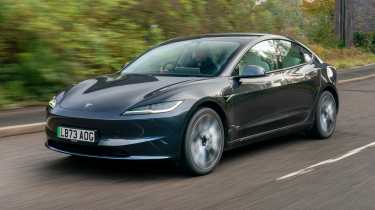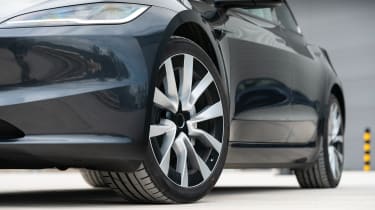Tesla Model 3 review – more compelling than ever?
Better built, more refined and more efficient, the new Model 3 is a welcome step forward – and one of the best value EVs available
It’s fair to say that the Tesla Model 3 has deeply embedded itself into the British motoring landscape, with sales eclipsing not just other electric cars but many key compact executive rivals. While it’s sometimes impossible to ignore the controversy around Tesla and the way it operates, the impact it’s had in integrating electric cars into the psyche of modern everyday motorists has been profound, whether you’re a fan of electric cars or not.
With a swarm of rivals coming from all sides, Tesla has given the Model 3 a significant update for 2024 while also making it cheaper to buy than before. Elements such as build quality, rolling refinement and efficiency have been the focus for the facelift, but the usual Tesla quirks and idiosyncrasies – plus a one or two new ones – have been carried across.
The question is, does the Model 3 still operate at the sharp end of the EV market, or have rivals from Polestar, BMW and Volkswagen caught up? Read on to find out.
Tesla Model 3 – in detail
- Engine, transmission and technical details – Single and dual motor powertrains are available, with the latter offering a bigger battery for more range
- Performance and 0-60 time – There's no new Model 3 Performance yet, but the Long Range still offers enormous pace
- Ride and handling – For what it lacks in finesse, the Model 3 counters with impressive handling characteristics and raw grip
- MPG and running costs – The cost of running a Model 3 is dependent on whether you can charge at home, but the Supercharger network does bring added convenience
- Interior and tech – With no buttons, dials or column stalks, the Model 3's interior is extremely minimalistic – for better and worse
- Design – The Model 3 has sharpened up for 2024, but the shape is still unconventional and awkward from certain angles
Prices, specs and rivals
The Tesla Model 3 range is very straight forward. Until a facelifted Performance version inevitably arrives, you can choose from a £39,990 single motor version or the dual-motor Long Range for £49,990.
More reviews
In-depth reviews
An enormous 15.4-inch touchscreen comes as standard, offering access to Tesla's feature-packed infotainment system and key vehicle functions. Refreshingly, there aren't many optional extras to choose from when ordering a Model 3 – aside from paint colours, wheel choice (18 or 19-inch alloys) and interior upholstery, the range is rather homogonous. The biggest additional costs come with the Enhanced Autopilot and (dubiously named) Full Self-Driving Capability packs coming in at £3400 and £6800 respectively.
The Polestar 2 is a close match for the Tesla in its layout and body style. In single-motor form it delivers similar performance (0-62mph in 6.2sec) and slightly more range (339 miles) than the base Model 3, but costs substantially more at £44,950. The Hyundai Ioniq 6 is another contender, majoring on cruising refinement and efficiency. It's an accomplished saloon that achieves 338 miles from a charge in base form, but at £47,040 it's priced closer to the dual-motor, 390-mile Model 3 Long Range.
Speaking of which, the Long Range is priced to compete directly with BMW's i4 eDrive35, which remains the driver's choice in this class. The i4 feels more conventional than the Model 3 but also more intuitive to drive and better built, but in raw performance terms it's a good distance behind the Tesla. The eDrive35's claimed 299-mile range is significantly shorter, too.




